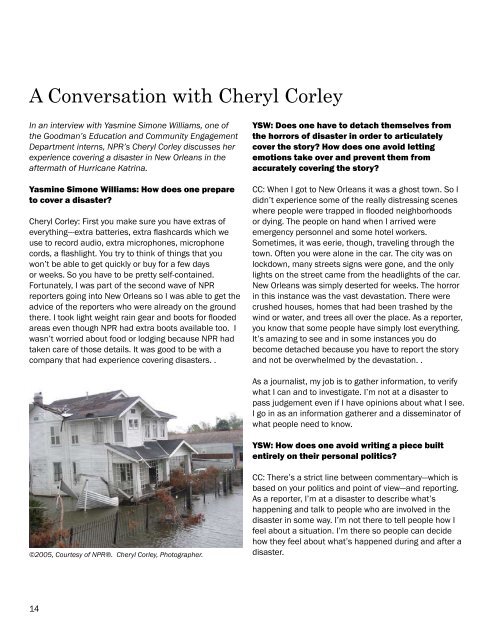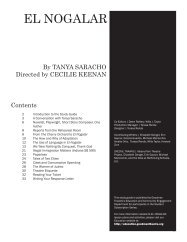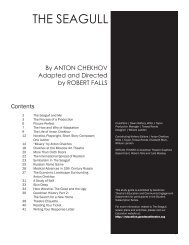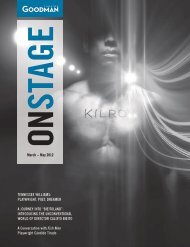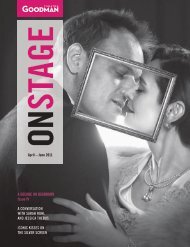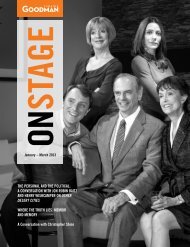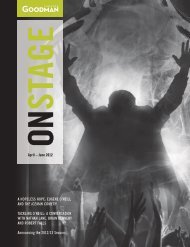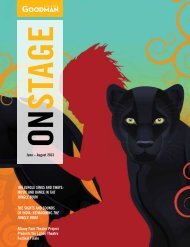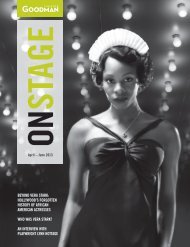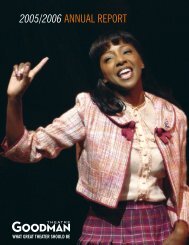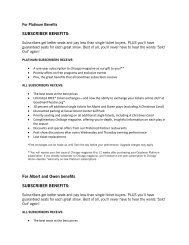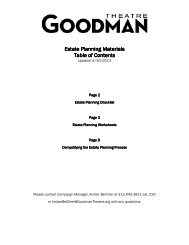A True History of the Johnstown Flood Study - Goodman Theatre
A True History of the Johnstown Flood Study - Goodman Theatre
A True History of the Johnstown Flood Study - Goodman Theatre
You also want an ePaper? Increase the reach of your titles
YUMPU automatically turns print PDFs into web optimized ePapers that Google loves.
A Conversation with Cheryl Corley<br />
In an interview with Yasmine Simone Williams, one <strong>of</strong><br />
<strong>the</strong> <strong>Goodman</strong>’s Education and Community Engagement<br />
Department interns, NPR’s Cheryl Corley discusses her<br />
experience covering a disaster in New Orleans in <strong>the</strong><br />
aftermath <strong>of</strong> Hurricane Katrina.<br />
Yasmine Simone Williams: How does one prepare<br />
to cover a disaster?<br />
Cheryl Corley: First you make sure you have extras <strong>of</strong><br />
everything---extra batteries, extra flashcards which we<br />
use to record audio, extra microphones, microphone<br />
cords, a flashlight. You try to think <strong>of</strong> things that you<br />
won’t be able to get quickly or buy for a few days<br />
or weeks. So you have to be pretty self-contained.<br />
Fortunately, I was part <strong>of</strong> <strong>the</strong> second wave <strong>of</strong> NPR<br />
reporters going into New Orleans so I was able to get <strong>the</strong><br />
advice <strong>of</strong> <strong>the</strong> reporters who were already on <strong>the</strong> ground<br />
<strong>the</strong>re. I took light weight rain gear and boots for flooded<br />
areas even though NPR had extra boots available too. I<br />
wasn’t worried about food or lodging because NPR had<br />
taken care <strong>of</strong> those details. It was good to be with a<br />
company that had experience covering disasters. .<br />
YSW: Does one have to detach <strong>the</strong>mselves from<br />
<strong>the</strong> horrors <strong>of</strong> disaster in order to articulately<br />
cover <strong>the</strong> story? How does one avoid letting<br />
emotions take over and prevent <strong>the</strong>m from<br />
accurately covering <strong>the</strong> story?<br />
CC: When I got to New Orleans it was a ghost town. So I<br />
didn’t experience some <strong>of</strong> <strong>the</strong> really distressing scenes<br />
where people were trapped in flooded neighborhoods<br />
or dying. The people on hand when I arrived were<br />
emergency personnel and some hotel workers.<br />
Sometimes, it was eerie, though, traveling through <strong>the</strong><br />
town. Often you were alone in <strong>the</strong> car. The city was on<br />
lockdown, many streets signs were gone, and <strong>the</strong> only<br />
lights on <strong>the</strong> street came from <strong>the</strong> headlights <strong>of</strong> <strong>the</strong> car.<br />
New Orleans was simply deserted for weeks. The horror<br />
in this instance was <strong>the</strong> vast devastation. There were<br />
crushed houses, homes that had been trashed by <strong>the</strong><br />
wind or water, and trees all over <strong>the</strong> place. As a reporter,<br />
you know that some people have simply lost everything.<br />
It’s amazing to see and in some instances you do<br />
become detached because you have to report <strong>the</strong> story<br />
and not be overwhelmed by <strong>the</strong> devastation. .<br />
As a journalist, my job is to ga<strong>the</strong>r information, to verify<br />
what I can and to investigate. I’m not at a disaster to<br />
pass judgement even if I have opinions about what I see.<br />
I go in as an information ga<strong>the</strong>rer and a disseminator <strong>of</strong><br />
what people need to know.<br />
YSW: How does one avoid writing a piece built<br />
entirely on <strong>the</strong>ir personal politics?<br />
©2005, Courtesy <strong>of</strong> NPR®. Cheryl Corley, Photographer.<br />
CC: There’s a strict line between commentary—which is<br />
based on your politics and point <strong>of</strong> view—and reporting.<br />
As a reporter, I’m at a disaster to describe what’s<br />
happening and talk to people who are involved in <strong>the</strong><br />
disaster in some way. I’m not <strong>the</strong>re to tell people how I<br />
feel about a situation. I’m <strong>the</strong>re so people can decide<br />
how <strong>the</strong>y feel about what’s happened during and after a<br />
disaster.<br />
14


